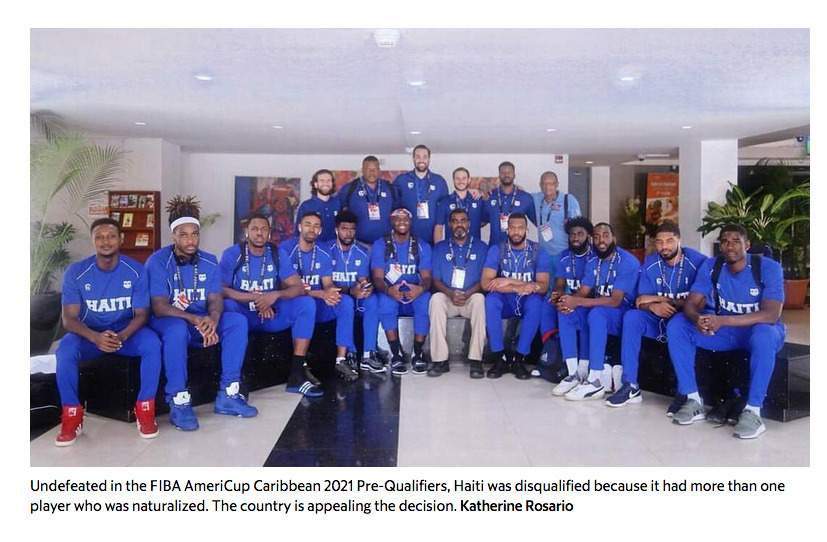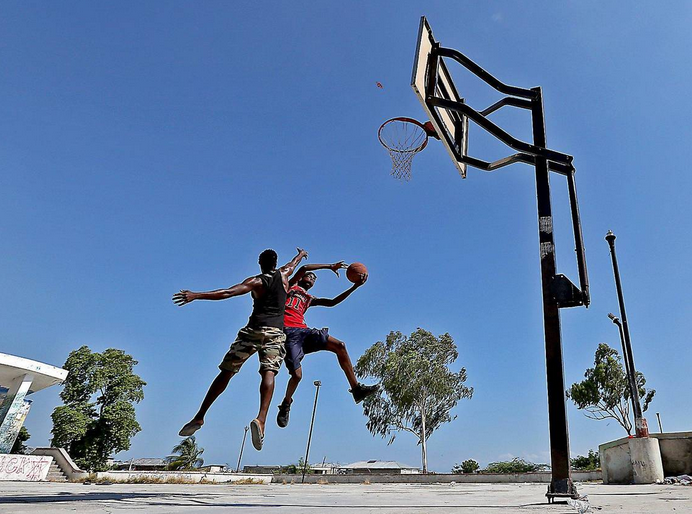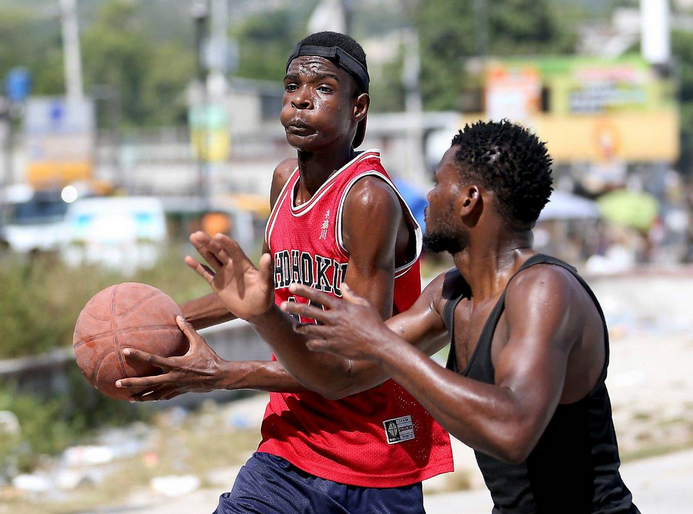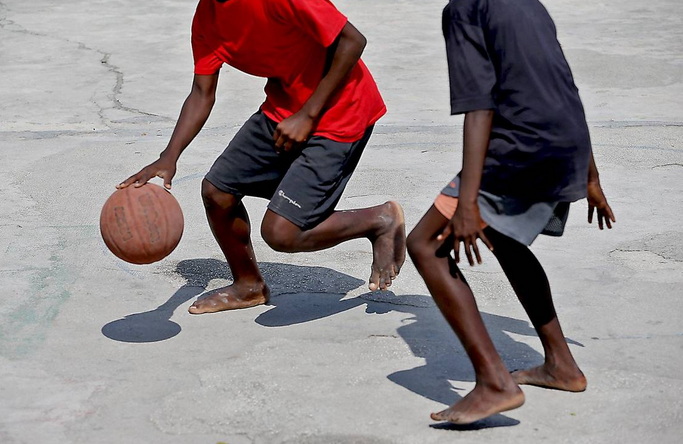By Jacqueline Charles
jcharles@miamiherald.com
July 05, 2018 07:00 AM
Updated July 05, 2018 10:41 AM
PORT-AU-PRINCE
Haiti had been absent from the international basketball scene for nearly 40 years.
So when the country made its official comeback last week by beating national teams from Barbados, Montserrat, Antigua and Barbuda, and Bermuda at the International Basketball Federation AmeriCup Caribbean 2021 Pre-Qualifiers in Suriname, the undefeated run made news even in World Cup-crazed Haiti.
All hopes of a championship season, however, were quickly dashed. Twelve hours before the semifinals, the Haiti national basketball team was booted from the competition by FIBA Americas, which cited its rule governing nationality. Only one player on a national team can be a naturalized citizen, the rule says, and he had to have done so prior to his 16th birthday.
Haiti, which is appealing the decision, is trying to rebuild its program virtually from scratch in a country whereindoor facilities are limitedand U.S. visas are hard to come by.
“We have a 37-year absence on the international stage,” said Steeve Polycarpe, general secretary of the Haitian Basketball Federation, the sport’s governing body in the country.
Young men in Haiti play a game of pickup basketball on the outskirts of Port-au-Prince.PATRICK FARRELL Pfarrell@Miamiherald.com
Polycarpe concedes that nine of the 11 players the team took to Suriname were born outside of Haiti. But they are Haitian, he said, noting that the players’ parents are Haitian and, under Haiti’s law, that entitles them to a Haitian passport. They are not naturalized Haitians, he insists.
“We went with our Constitution,” he said. “They are Haitian. But the way they’ve taken this decision, they are deciding for us who is Haitian. … You cannot decide for a country who is or isn’t Haitian. Their mother is Haitian, their father is Haitian, that makes them Haitian.”
Furthermore, Polycarpe said some Haiti-born players who the federation had hoped would make the national team, were barred from attending a June tryout in Miami, where the team’s roster was finalized, after the U.S. embassy in Port-au-Prince refused to grant them visas. Tryouts were held in Miami because Haiti lacks adequate sports facilities.
“Before we registered for the competition, we sent them everyone’s file, including their Haitian passports,” Polycarpe said, referring to FIBA and its disqualification decision. “The only thing they wanted to know if any of them had ever played for the United States. They wrote to [USA Basketball], which confirmed that these guys had never played for the U.S. in any category.”
Haiti is still soccer-crazy. But in recent years, basketball has been growing in popularity throughout the country, which this year was disqualified from its first international tournament in 37 years amid questions about the nationality of its players.Patrick Farrell Miami Herald
Even more perplexing, said Polycarpe, is that after forcing Haiti to forfeit, FIBA said it had to play against Saint Lucia or risk being fined up to $25,000 and banned from future FIBA competitions. “I just don’t understand,” Polycarpe said. Haiti played the gameand won.
“Haiti had accepted to play under the condition that the eligibility of its players, and consequently of the Haitian national team’sgame results, would be examined during/after the event,” FIBA spokesman Simon Wilkinson said.
Wilkinson did not respond to criticism that FIBA — which also had to deal with a wild brawl that involved Milwaukee Bucks forward Thon Maker during a World Cup qualifying game between Australia and the Philippines on Monday — was overstepping its role by telling a country who is or isn’t a citizen.
Patrick Washington — a Dallas high-school basketball coach who has been assisting in the revival of international ball here — said while it’s extremely disappointing that Haiti didn’t get a chance to play for a championship, the vision of reviving Haiti’s national basketball program remains very much alive.
“Haitian basketball is at a pivotal point,” Washington said.
While the NBA hasn’t attracted as many Haitian athletes as top soccerleagues and the NFL, it does have its share of players with Haitian roots. Among the Haiti-born trailblazers: Yvon Joseph, who played at Miami Dade College before transferring to Georgia Tech, where he was drafted by the then-New Jersey Nets; Olden Polynice, who was the No. 8 pick in the 1987 draft and played until 2001; and Samuel Dalembert, who played for Seton Hall before becoming a first-round pick for the Philadelphia 76ers in 2001.
Dalembert, who stopped playing in the NBA in 2015, was the last NBA player from Haiti until Skal Labissièrewas drafted in 2016 by the Sacramento Kings. Among those who weren’t born in Haiti but cite Haitian roots: Blake Griffin of the Detroit Pistons and Nerlens Noel, who ESPN reported this week agreed to a two-year deal with the Oklahoma City Thunder. Current Orlando Magic assistant coach and three-time NBA champion Mario Elieis also of Haitian heritage.
“Haitians have been around basketball for a very long time,” Washington said. “It’s just that no one has talked about it.”
Supporters of basketball in Haiti want to see the Caribbean nation return to competitive play internationally.PATRICK FARRELL Miami Herald
During a visit to Port-au-Prince last summer, Washington was very happy to talk about it. He and federation president Henri Jean noted that the Haitian Basketball Federation is 66 years old.
Sitting on the terrace of the Karibe Hotel overlooking a densely populated Port-au-Prince, the two listed off names of current high school and college standouts with Haitian ties. Several tables behind them: Labissière, who seven years earlier was under the rubble from the 2010 Haiti earthquake.
It was Labissière’s first visit back since leaving for the United States to attend school and pursue his basketball dreams.
“I’ve been looking forward to this day,” he said in between breaks of running his first basketball clinic at one of the few indoor courts in the capital. “These were the best years of my life.”
While Labissière, however, managed to relocate to the U.S. to pursue basketball, others haven’t been as fortunate, which federation officials say is another constraint to basketball’s emergence in Haiti.
“There are Haitian kids who are getting full-ride scholarships to attend high school in the U.S. and they are getting denied visas,” Washington said, referring to private schools. “And we’re trying to find out what we need to do to get these kids in the U.S. especially when they are getting scholarships.”
Still, there is something happening in Haiti. Travel past any sun-drenched roadside court, and young boys dressed in used LeBron James jerseys can be seen dribbling and role-playing a game that they’ve only seen on TV and still don’t fully understand.
“You have these kids that are playing basketball in the U.S. and they are really, really good,” Washington said. “It lends itself to let people see there is some talent here and when that happens, college coaches take notice; they want to know about the players. They want to see players. ”
________________________________________________________



